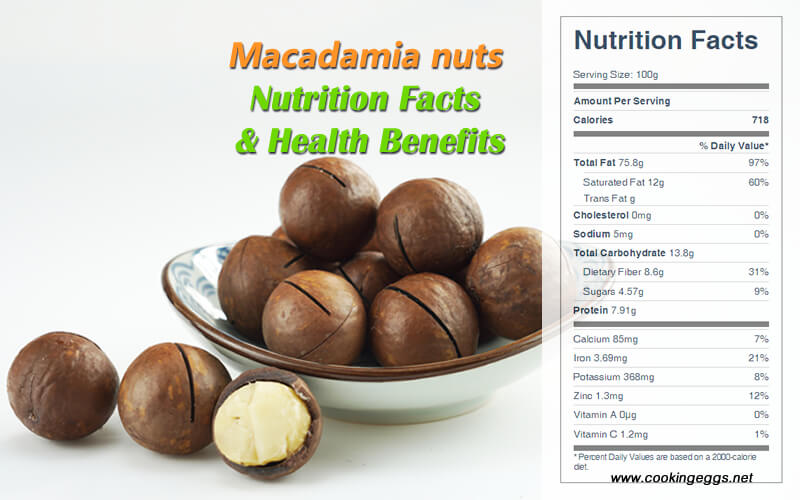Macadamia nuts Nutrition Facts & Health Benefits
Macadamia nuts, also known as Queensland nuts, are considered one of the highest-ranking nuts because of their high-quality oil. Macadamia nuts are rich in nutrients, especially unsaturated fatty acids. Here are the nutritional benefits of macadamia nuts.
The nutritional value of Macadamia nuts
Compared with other common edible nuts, such as almonds and cashews, macadamias are high in total fat and relatively low in protein. They have a high content of monounsaturated fats (59% of total content) and contain, as 17% of total fat, the monounsaturated fat omega-7 palmitoleic acid.
Raw macadamia nuts are 1% water, 14% carbohydrates, 76% fat, and 8% protein. A 100 gram reference amount of macadamia nuts provides 718 kcal and is a rich source of numerous essential nutrients, including thiamine, vitamin B6, other B vitamins, manganese, iron, magnesium and phosphorus.

Macadamia nuts Nutrition Facts Label
Health Benefits of Macadamia nuts
Macadamia nuts are high in fat (70%), low in protein (8%), and high in carbohydrates, calcium, iron, phosphorus, selenium, and zinc.They are said to rejuvenate the liver, discourage alcohol cravings, improve anemia, and aid in convalescence. Macadamias are also phlegm-forming foods.
Macadamia nuts are beneficial in helping lower cholesterol and reduce inflammation, and they have a unique fatty acid component that has anticancer properties.
Macadamia nuts can prevent arteriosclerosis and lower cholesterol levels, reducing the incidence of heart disease and hypertension, making them very suitable for the elderly.
When compared to other oils, macadamia nut oil has the highest percentage of unsaturated fats, approximately 80%.Macadamia nuts have the highest concentration of MUFAs in their oil, primarily oleic (60%) and palmitoleic acid (20%).The high content of MUFAs directly affects LDL cholesterol levels, which translates to a cardiovascular benefit. Palmitoleic acid accounts for 51.3 percent of the MUFA content, while oleic acid accounts for 22.6 percent.Oleic acid is the key MUFA that protects against cardiovascular disease.
The total MUFA and PUFA content of macadamia nuts exceeds 80% of the total composition.Omega-7 is a naturally occurring trans-fatty acid, also found in human milk. The term "trans-fatty acid" has a negative connotation. Typically man-made, trans-fatty acids are found in fast foods and processed foods and are what clog arteries and negatively affect our health. However, this naturally occurring trans-fatty acid has been found to have some positive effects. Studies done on vaccenic acid found in human milk have demonstrated anticarcinogenic properties.
Macadamia nuts are rich in nutrients. They contain eight essential amino acids and are also rich in minerals and vitamins.
Macadamia nut oil is rich in oleic acid, which can promote the body's absorption of calcium, phosphorus, zinc, and other minerals and improve bone density. The elderly often consume macadamia oil, which can effectively prevent osteoporosis.
Macadamia nuts also possess anti-inflammatory activity. Prolonged lipopolysaccharides that come from the diet can lead to endotoxemia. The ability to reduce LPS, which we commonly see as high in anyone consuming the standard American diet, is critical. To preserve all these benefits, roasting is the most commonly used processing method to preserve the quality and improve the shelf life of macadamia nuts.